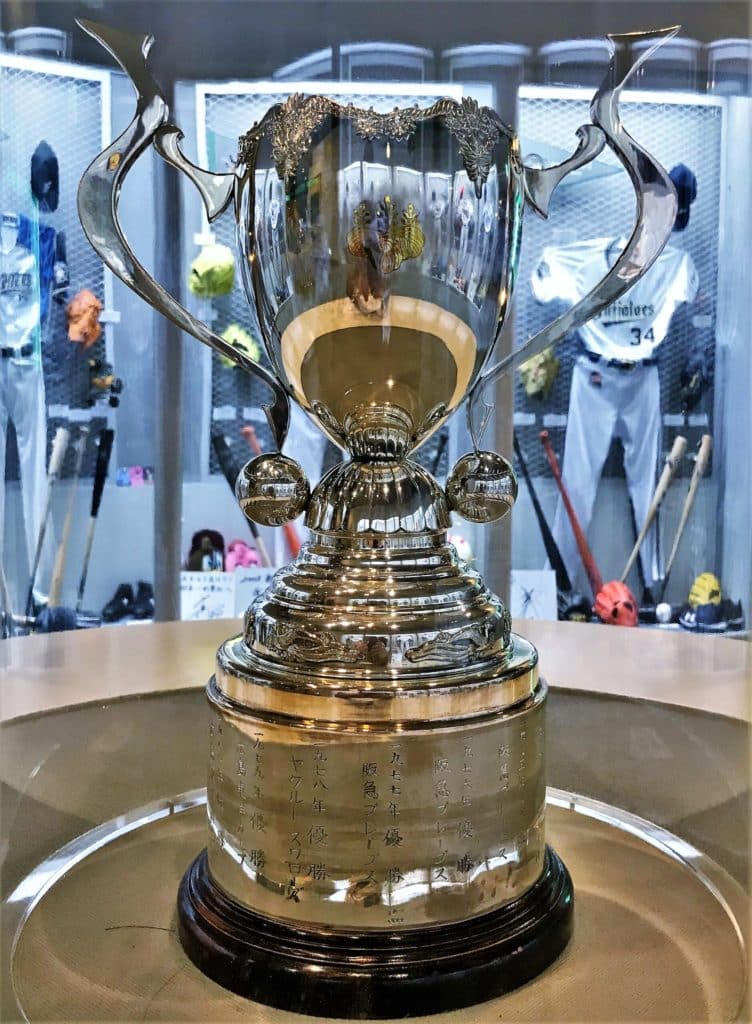
Since 1950, Nippon Professional Baseball (NPB) has been the highest level of baseball in Japan. The league comprises 12 teams divided into two circuits – the Pacific League and Central League.
Certain aspects of NPB are unique to Japan, such as:
- 143 regular-season games (that begin in late March or early April, and end in early October).
- Tie ballgames after 12 innings (the tale is that this gives fans a better chance at catching the last train home, as nearly everyone takes the train to the ballpark!).
- Six-man pitching rotations (teams play six days a week, with Mondays off, so each starting pitcher pitches once per week).
- A limit to four “import” or non-Japanese players on each team’s active roster, of which there can be no more than three hitters or three pitchers (i.e. a team’s four foreign players can’t be all pitchers or all hitters). Exactly who qualifies as an import player is more easily explained by defining who a “domestic” player is. A domestic player is a Japanese citizen, played amateur baseball in Japan, lived in Japan for a specific period of time, or has nine years of NPB service time.
- The manager has a heavy influence on the game, especially in requiring his players to play “small ball.” For example, sacrifice-bunting a runner to second base in the first inning, bringing the infield in frequently, or requiring that the outfielders play extremely shallow with two outs and a pivotal runner on second base.
- A particularly welcoming attitude towards the visiting team’s fans: there is a designated visiting team cheering section, the away team’s fight song is played before the 7th inning, and hats and merchandise of the team are for sale at the ballpark.
Although sumo is Japan’s official national sport, baseball is its most popular one. The passion for the game is as strong – or perhaps stronger – in Japan as anywhere else in the world. The most noticeable feature of an NPB game is the crowd. Fans cheer diligently throughout the entire game, no matter the score or the inning. And it’s not just polite clapping or obligatory words of encouragement – each batter has a designated song that the crowd sings for the entirety of his at-bat, complete with in-seat percussion by clapping, using plastic bats, or whatever other noise-maker is available (beer cups, for example!).
The midpoint of the Japanese baseball season is marked by All-Star festivities and ceremonies, including a multi-game All-Star Series. Schedules also feature a period of interleague play between teams of the Pacific League, which employs a designated hitter, and the Central League, which offers a more traditional style of baseball and could be likened to the (pre-designated hitter era) National League of MLB.
In early to mid-October, at the end of the regular season, six teams participate in the NPB playoffs, formally known as the “Climax Series.” The First Stage features the second and third-place teams in each league playing one another in a three-game series, with the second-place team earning home-field advantage for all three games. The two regular season league champions are the top seeds in each bracket and receive a “bye” in the First Stage.
The winner advances to the Second Stage, where they play their league’s first-place team in what is essentially a best-of-seven series in which the first-place team automatically starts with a 1-0 series advantage. As the top seed, the first-place team has home field for all six games and only needs to win three games to advance; no more than six games are actually played in the series.
At the end of the Climax Series, the two winners from each league meet in the best-of-seven championship known as the “Nippon Series” (commonly referred to in English as the Japan Series). The Japan Series ends in late October or early November. The Tokyo Yomiuri Giants are the team with the most Nippon Series championships, with 22 as of 2024.
For more about NPB baseball, including team overviews and stadium profiles, follow the links in the “Japanese Baseball” dropdown menu above. If you’d like to experience Japan’s unique baseball culture for yourself, consider one of our guided tours!